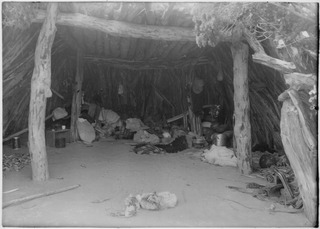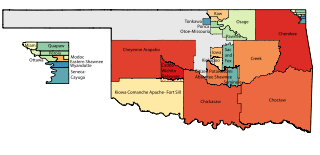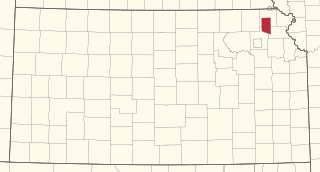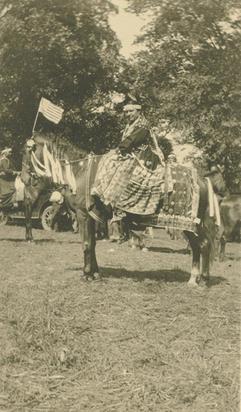
The Kickapoo people are an Algonquian-speaking Native American tribe and Indigenous people in Mexico, originating in the region south of the Great Lakes. Today, three federally recognized Kickapoo tribes are in the United States: the Kickapoo Tribe in Kansas, the Kickapoo Tribe of Oklahoma, and the Kickapoo Traditional Tribe of Texas. The Oklahoma and Texas bands are politically associated with each other. The Kickapoo in Kansas came from a relocation from southern Missouri in 1832 as a land exchange from their reserve there. Around 3,000 people are enrolled tribal members.

The Sauk or Sac are Native Americans and Indigenous peoples of the Northeastern Woodlands. Their historical territory was near Green Bay, Wisconsin. Today they have three tribes based in Iowa, Kansas, Nebraska, and Oklahoma. Their federally recognized tribes are:

Indian Territory and the Indian Territories are terms that generally described an evolving land area set aside by the United States government for the relocation of Native Americans who held original Indian title to their land as an independent nation-state. The concept of an Indian territory was an outcome of the U.S. federal government's 18th- and 19th-century policy of Indian removal. After the American Civil War (1861–1865), the policy of the U.S. government was one of assimilation.

The Iowa, also known as Ioway, and the Bah-Kho-Je or Báxoje, are a Native American Siouan people. Today, they are enrolled in either of two federally recognized tribes, the Iowa Tribe of Oklahoma and the Iowa Tribe of Kansas and Nebraska.
The Sac and Fox Nation is the largest of three federally recognized tribes of Sauk and Meskwaki (Fox) Indian peoples. Originally from the Lake Huron and Lake Michigan area, they were forcibly relocated to Oklahoma in the 1870s and are predominantly Sauk. The Sac and Fox Oklahoma Tribal Statistical Area (OTSA) is the land base in Oklahoma governed by the tribe.

The Otoe are a Native American people of the Midwestern United States. The Otoe language, Chiwere, is part of the Siouan family and closely related to that of the related Iowa, Missouria, and Ho-Chunk tribes.

The Meskwaki, also known by the European exonyms Fox Indians or the Fox, are a Native American people. They have been closely linked to the Sauk people of the same language family. In the Meskwaki language, the Meskwaki call themselves Meshkwahkihaki, which means "the Red-Earths", related to their creation story.

The Kickapoo Tribe of Oklahoma is one of three federally recognized Kickapoo tribes in the United States. There are also Kickapoo tribes in Kansas, Texas, and Mexico. The Kickapoo are a Woodland tribe, who speak an Algonquian language. They are affiliated with the Kickapoo Traditional Tribe of Texas, the Kickapoo Tribe in Kansas, and the Mexican Kickapoo.
Indian termination describes United States policies relating to Native Americans from the mid-1940s to the mid-1960s. It was shaped by a series of laws and practices with the intent of assimilating Native Americans into mainstream American society. Cultural assimilation of Native Americans was not new; the belief that indigenous people should abandon their traditional lives and become what the government considered "civilized" had been the basis of policy for centuries. What was new, however, was the sense of urgency that, with or without consent, tribes must be terminated and begin to live "as Americans." To that end, Congress set about ending the special relationship between tribes and the federal government.

Native American tribes in the U.S. state of Nebraska have been Plains Indians, descendants of succeeding cultures of indigenous peoples who have occupied the area for thousands of years. More than 15 historic tribes have been identified as having lived in, hunted in, or otherwise occupied territory within the current state boundaries.

Prairie Band Potawatomi Nation is a federally recognized tribe of Neshnabé, headquartered near Mayetta, Kansas.
The Sac and Fox Reservation of Sauk (Sac) and Meskwaki (Fox) people is a 23.639 sq mi (61.226 km2) tract located in southeastern Richardson County, Nebraska, and northeastern Brown County, Kansas. It is governed by the Sac and Fox Nation of Missouri in Kansas and Nebraska, and the headquarters for reservation is in Reserve, Kansas. The tribal jurisdiction area is west of White Cloud, Kansas and northeast of Hiawatha, Kansas. It was created as a consequence of the Platte Purchase of 1836.

The Iowa Reservation of the Iowa Tribe of Kansas and Nebraska straddles the borders of southeast Richardson County in southeastern Nebraska and Brown and Doniphan counties in northeastern Kansas. Tribal headquarters are west of White Cloud, Kansas. The reservation was defined in a treaty from March 1861. As of 2023, the tribe operates Casino White Cloud on the reservation.

The Sac and Fox Nation of Missouri in Kansas and Nebraska is one of three federally recognized Native American tribes of Sac and Meskwaki (Fox) peoples. Their name for themselves is Nemahahaki and they are an Algonquian people and Eastern Woodland culture.

Oklahoma Tribal Statistical Area is a statistical entity identified and delineated by federally recognized American Indian tribes in Oklahoma as part of the U.S. Census Bureau's 2010 Census and ongoing American Community Survey. Many of these areas are also designated Tribal Jurisdictional Areas, areas within which tribes will provide government services and assert other forms of government authority. They differ from standard reservations, such as the Osage Nation of Oklahoma, in that allotment was broken up and as a consequence their residents are a mix of native and non-native people, with only tribal members subject to the tribal government. At least five of these areas, those of the so-called five civilized tribes of Cherokee, Choctaw, Chickasaw, Creek and Seminole, which cover 43% of the area of the state, are recognized as reservations by federal treaty, and thus not subject to state law or jurisdiction for tribal members.

The Kickapoo Tribe of Indians of the Kickapoo Reservation in Kansas is one of three Federally recognized tribes of Kickapoo people. The other Kickapoo tribes in the United States are the Kickapoo Traditional Tribe of Texas and the Kickapoo Tribe of Oklahoma. The Tribu Kikapú are a distinct subgroup of the Oklahoma Kickapoo and reside on a hacienda near Múzquiz Coahuila, Mexico; they also have a small band located in the Mexican states of Sonora and Durango.
The Kansas Act of 1940 addressed the means by which Congress could use its power under the Indian Commerce Clause to authorize a state's ability to exercise jurisdiction in certain instances. Because the inherent sovereignty of Indian nations generally precluded state jurisdiction over Indian country, the Act became one of the first legislative actions to permit state jurisdiction over most offenses committed by or against Indians on Indian reservations. This was a departure from previous federal policy in which the Federal Government had sole jurisdiction over Indians. The Act was a precursor to the Indian termination policy and in essence was a kind of "trial legislation" to see if such transfers would be effective. Several other states followed suit. Today, the jurisdictional gap which existed when the Kansas Act was passed no longer exists, and instead there is an overlap; a native person committing a single crime within Indian country in the state of Kansas could be prosecuted by the United States, the State of Kansas, and one of the tribes.

Minnie Evans was a tribal chair of the Prairie Band of Potawatomi Nation who successfully defeated termination of her tribe and filed for reparations with the Indian Claims Commission during the Indian termination policy period from the 1940s to the 1960s.
Vestana Cadue(Kickapoo name: Pam-o-thah-ah-quah) was the first female chairperson of the Kickapoo Tribe in Kansas. She was elected just months prior to the passage of House Concurrent Resolution 108 calling for the termination of her tribe. She led the tribal effort to successfully defeat enactment of a termination bill on the Kansas Kickapoo.














